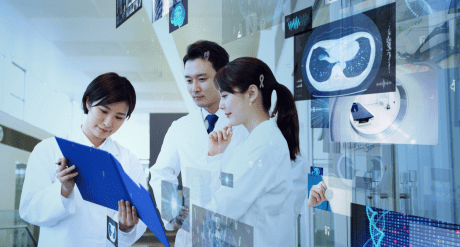
7 Hot Topics at MedTech Forum 2022

The MedTech Forum is the largest health and medical technology industry conference in Europe and took place in Barcelona on 3-5 May 2022. More than 800 people attended in person to discuss topics affecting the MedTech industry both now and in the future.
For those who missed out on attending, we have highlighted 7 key topics discussed of high importance to both the industry and its stakeholders, which have the potential to directly impact their compliance.
1) Sustainability in Healthcare
An important aspect of sustainability in healthcare within MedTech is the use of hazardous plasticizers, incineration and recycling of medical devices.
The speakers discussed the use of PVC (PolyVinyl Chloride) in healthcare in order to achieve a non-toxic environment. The chemical industry is trying to develop safe alternative plasticizers and four of them may be added to the Medical Devices Regulation (MDR).
Regarding the incineration of PVC medical waste, one proposal is to convert hazardous residues into useful products and avoid releasing dioxins and hydrochloride into the environment.
In relation to the medical device recycling, the panellists highlighted that the main goal is to avoid the substances of concern outlined in REACH, for example, DEHP – di(2-Ethylhexyl) phthalate – and make its use an exception that will require authorisation and justification.
Finally, the presentation highlighted several areas that should be observed when we think about sustainability, including reduction of carbon footprint, waste (disposable instruments) and medication in drinking water.
2) International Data Transfers
Given the relevance of international data transfer and the invalidation of the EU-US Privacy Shield, this panel focused on the New Trans-Atlantic Data Privacy Framework.
The New Trans-Atlantic Data Privacy Framework was announced on 25 March 2022 and as the panellist David Peloquin said, it is an agreement in principle between the U.S. government and the European Commission aiming to share data.
Important aspects of the Trans-Atlantic Data Privacy Framework were highlighted, including lessons learned from GDPR as well as the recent U.S privacy law and these included;
- The framework can be adopted by jurisdictions worldwide
- Shortcomings are still found in the current regimes
- Numerous treatments may involve the coordination of healthcare providers across various geographies
- Data from devices may be analysed in multiple countries
- Clinical trials are frequently conducted in multiple jurisdictions
3.) ESG – Environment, Social and Governance
Increasingly, companies are being called upon to consider the topic of environment, social and governance, since they could be required to produce a report based on the Taxonomy Regulation, and the healthcare sector needs to ensure it is not left out.
Following the World Health Organization analysis, the panellists in this session emphasized the need for the healthcare industry to face the major ESG challenges. They highlighted several influencing factors including the following;
- 100M people may be pushed into extreme poverty due to health expenses;
- 4% global total emissions healthcare industry emissions;
- Focus on water management/reuse and reduce the water withdraw
Therefore, companies must align their plan in order to achieve better results in relation to sustainability, human rights, employee and environmental matters. The panel suggested that companies could create an ESG Strategy that observes the following points:
- Climate Action (e.g., CO2 footprint, regulation, compliance)
- Materials and Circularity
- Water and Effluents (e.g., REACH/ROCE)
- Social Responsibility (e.g., Health and Safety, labour conditions)
- Governance (anti-corruption, remuneration and compliance)
4) HTA – Health Technology Assessment
The Health Technology Assessment Regulation entered into force on 11 January 2022, however, it will be applied from 12 January 2025.
This Regulation aims to facilitate health technology development in terms of joint clinical assessment (JCA) and joint scientific consultation. Furthermore, it intends to enhance a support framework and procedures for the cooperation of the Member States, a mechanism involving any information, data, analyses and others to be submitted by the health technology developer-only once at Union level, and common rules and methodologies for the JCA of health technologies.
Since it is still ongoing, the Member State Coordination Group is developing rules of procedures, reports, methodological guidance, procedural steps and other activities to achieve implementation and stakeholders must be aware of such.
5) European Health Data Space (EHDS) – eHealth Network
Several speakers on this topic highlighted the common goal to simplify the EU cross-border health data exchange and create a single market to share these data. Certain ethical prerequisites will need to be considered for European citizens.
Moreover, the rise of Digital Health should be grounded in a reliable environment in order to:
- To create a unique gateway for easy, unified, transparent and secure access to health data
- To develop health improvements
- To increase the research and development of Artificial Intelligence devices
- To make progress on medical research and multiply access to data sources in the shortest possible time
6.) UDI – Unique Device Identification
James Gianoutsos, CEO of Rimsys has explained the importance and challenges of the Unique Device Identification (UDI).
UDI aims to improve on the traceability of medical devices, avoid counterfeiting, provide satisfactory management of post-market monitoring, refine the device documentation and reduce the medical errors by healthcare professionals.
The UDI must contain accurate information, based on the proper regulation, e.g. Device Identifier, company prefix, check character, manufacturing lot, batch, serial number and others, so that it can achieve all goals aforementioned.
The achievement of global UDI adoption is very interesting from a global market perspective and other worldwide implementations during the next years include:
- USA – implementation schedule: 2014 to 2022
- EU – implementation schedule: 2022 to 2026
- China – implementation schedule: 2021 to 2026
- Brazil – implementation scheduled for 2023
7) Labeling
Dr. Bob Durgin, Vice President, Regulatory Affairs Global Policy of Johnson & Johnson addressed the opportunities for modernizing regulatory policy on labelling and the possibility and necessity to develop an E-Labelling.
In view of the rise of inflation, a call for sustainability, high costs and operational implications, the regulatory developers should visualize the relevance of reducing costs, optimise procedures, provide accurate information and other elements that can create a better scenario for those who work with medical devices.
Consequently, they should consider that among other numerous benefits, electronic labelling (E-label) promises to expand the access to information on medical devices, improve operational efficiency, implement sustainability goals and enable efficiencies in the administration of regulatory procedures.
Book Time With Our Team
Learn how C2P can help you stay ahead of medical device regulatory changes and achieve uninterrupted market access.








